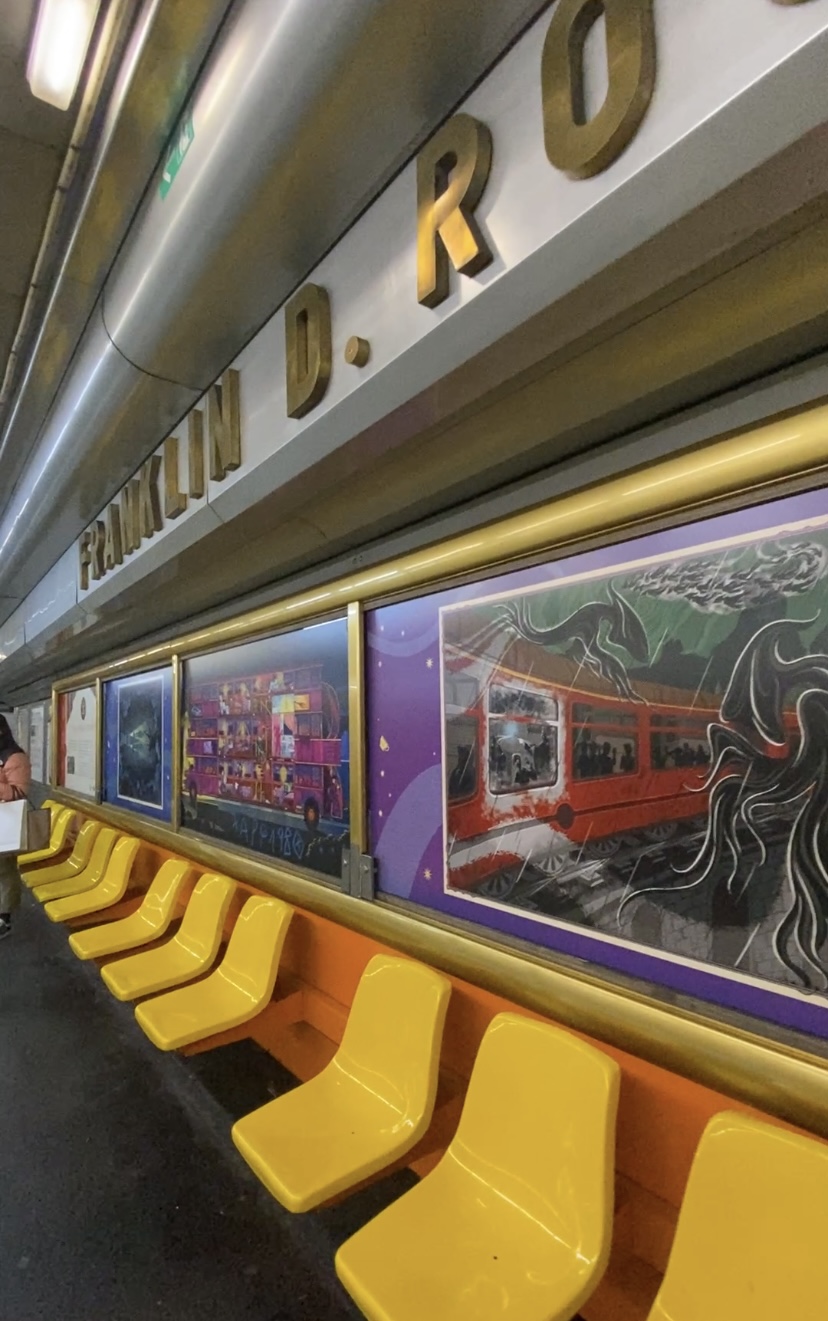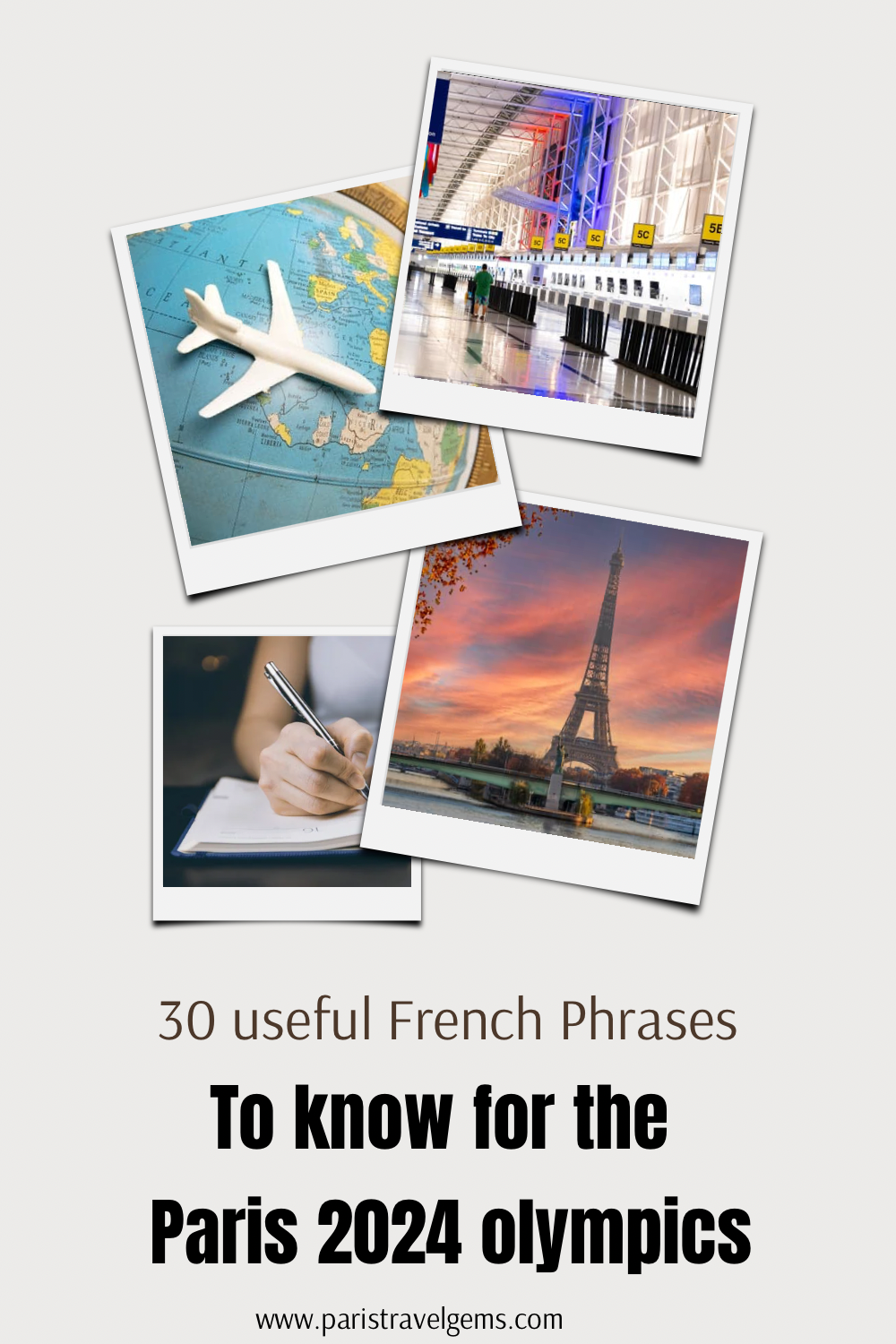
If you will be among those traveling to Paris for the 2024 Olympics, in this blog post, I share 30 useful French phrases to know for the Paris 2024 Olympics. These phrases will be a great way for you to practice your French and also better communicate with locals.
Table of Contents
What to expect for the 2024 Olympics
In the summer of 2024, all eyes will be on the French capital, the host of the 2024 olympics and Paralympic games. The streets of Paris are anticipated to brim with excitement as athletes and spectators from around the globe gather at its iconic landmarks.
The opening ceremony will kick off the festivities on Friday, July 26. Moreover crowds will assemble along the Seine River and at various venues to witness sporting events taking place amidst the beautiful centuries-old architecture.
The Champs-Élysées will become a bustling hub of activity and celebration of French culture. Parisian cafes and bistros will be overflow with patrons, savoring culinary delights amidst the fervor of Olympic fervor. Wondering what else to do, you might like this post regarding things to do in Paris here.
Public transport Paris 2024 olympics and paralympics Games
From Friday, July 26 to Sunday, August 11, 2024, the Olympic Games will be held. It will be followed by the Paralympic Games from August 28 to September 8, 2024. During this time, roads and public transport will be very busy, which will have repercussions on your travel. Plan your wherabouts wisely. To check the traffic for Metro, buses, suburban trains and trams, visit the RATP website here.
30 Useful French Phrases to Know for Paris 2024 Olympics
Given the many activities that will be available in Paris, mastering essential French phrases each day will enhance your experience in the city of lights. These phrases and words are listed below.
1. Bonjour/ Bonsoir
These are the basic words that you use to greet people. We say bonjour in the morning and bonsoir in the evening.
2. Merci
Merci means thank you.
3. Je vous en prie
“Je vous en prie” translates to “you’re welcome.” While many people commonly say “de rien,” it’s worth noting that “Je vous en prie” is a more proper and elegant way to express yourself.
4.Oui ou non
The words “oui” and “non” hold profound significance beyond mere linguistic expression. “Oui,” meaning “yes,” embodies affirmation, agreement, and consent. It carries with it a sense of positivity, openness, and willingness. On the contrarty, non,” means “no. It delineates boundaries, expresses dissent, and asserts autonomy.
5. Au revoir
“Au revoir” the two words hold a poignant significance as a farewell greeting meaning “until we meet again
6. S’il vous plaît
s’il vous plaît” carries a deep significance within the realm of politeness and social interaction. Translated as “please,” these three words represent more than just a request; they embody courtesy, respect, and consideration for others. “
7. You formal (Vous)
In French, the term “you formal” refers to the polite and respectful way of addressing someone that you are not familiar with. Using the second person singular pronoun “vous.” “Vous” is employed in formal or unfamiliar contexts, as well as when addressing someone of higher social status, authority, or seniority. It signifies a certain level of distance and respect.
8.You non formal ( Tu)
“Tu” is used among friends, family members, and in casual settings. It is also used in a work setting ONLY when addressing certain colleagues that you are close to.
9.Pardon
“Pardon” encompasses a range of meanings beyond its simple translation of “excuse me” or “I’m sorry.” It serves as a versatile expression of apology, forgiveness, and politeness. Used in everyday interactions, “pardon” is employed to seek forgiveness for minor offenses, such as accidentally bumping into someone or interrupting a conversation.
10. Excusez-moi
Translated as “excuse me,” it serves as a versatile phrase used in a variety of situations. “Excusez-moi” is employed to apologize for minor inconveniences, such as accidentally bumping into someone or needing to pass through a crowded space. It also serves as a polite way to get someone’s attention or to request assistance.
11. Madame
“Madame” holds a significant place as a title of respect and courtesy when addressing a woman. Derived from the French word “ma dame,” meaning “my lady,” it is used to show deference and acknowledgment of a woman’s status, particularly in formal or polite settings. “Madame” is commonly used to address married or older women but also younger women.
12. Monsieur
Monsieur” is a term of respect and formality used when addressing a man. Stemming from the Old French “mon sire,” meaning “my lord,” it denotes deference and acknowledgment of a man’s status or authority. “Monsieur” is commonly employed in both casual and formal contexts, serving as a polite way to address men of various ages and social standings.
13. Je ne parle pas français
Je ne parle pas français” translates to “I do not speak French” in English. It is a straightforward statement indicating the speaker’s lack of proficiency in the French language. This phrase is often used by non-French speakers when communicating with French speakers to convey their inability to converse in French.
14. Je ne comprens pas
Je ne comprends pas is a French phrase that translates to “I don’t understand” in English. It is a straightforward expression used to indicate a lack of comprehension or understanding.
15. A bientôt
A bientôt simply means see you soon.
Now that you know a few every day interaction words, let’s dive into the French phrases to use at a restaurant.
16. Je m’appelle … et vous?
This sentence simply means “my name is… and yours? “
French phrases to use at a restaurant
17. Une table s’il vous plaît!
Une table s’il vous plaît simply means in English a table please! You can also add 1 or 2 people by saying, “une table s’il vous plait pour une ou deux personnes.”
18. l’addition
L’addition means check. In addition, do not forget to add s’il vous plaît!
19. Une carafe d’eau
It means a water pitcher. The water pitcher is free. You should not be charged for it.
20. Puis-je avoir le menu s’il vous plaît!
If you are seated and there is no menu on the table, you can ask for it by saying, “puis-je avoir le menu s’il vous plaît.
21. Je voudrais que ma viande soit …
In France, there are many ways of cooking meat consquently, it is important to tell the waiter how you want yours. You should say, je voudrais que ma viande soit… which means, I would like my meat:
- Bleue ( rare)
- Bien cuite ( well done)
- A point ( medium rare)
- saignante ( undertone
- Tendre ( tender)
Equally important, to better move around the city, here ‘s a couple of French phrases that you can use in the metro
Public transportation French phrases to use in Paris
22.Ticket de métro
Ticket de métro simply means “metro ticket”.
23. Un ticket s’il vous plaît
This is how you ask for tickets, if you need more than one, you can say the number follow by “ticket”.
24. Where can I find …
For first time travelers to Paris, navigating the metro system can be challenging. If you are looking for a bus, metro or tram, simply ask anyone this, ” où se trouve le metro, le bus ou le tram followed by its number.
25. Guichet
Guichet can be translated as the “ticket booth”. There, you will find help to buy your tickets.
26. Combien ça coûte?
Combien ça coûte is used to ask how much something costs.
27. Pouvez-vous m’aider s’il vous plaît?
Pouvez-vous m’aider s’il vous plaît means “can you help me please!”
28. Où se trouve les toilettes s’il vous plaît?
It simply means, ” where are the restrooms please?”
29. Je suis malade
Getting sick when traveling happens. If that hapens to you, let people know that you are sick by saying, “je suis malade”.
30. Pouvez vous appeler les pompiers s’il vous plaît
If you need help getting to a hospital, you have to call les pompiers. If you cannot do it yourself, ask someone to call them for you by saying, ” pouvez vous appeler les pompiers s’il vous plaît”.
Final thougts
In conclusion, armed with these 30 useful French phrases, navigating the streets of Paris during the 2024 Olympics will be a breeze. From polite greetings to ordering at local eateries, incorporating these expressions into your repertoire will not only enhance your cultural experience but also facilitate seamless interactions with locals. Moreover, mastering these phrases will undoubtedly contribute to a more enriching and memorable visit. So, as you prepare for your journey to Paris, remember to practice these phrases diligently, ensuring a smooth and rewarding experience during the 2024 Olympics.
PIN THIS IMAGE
